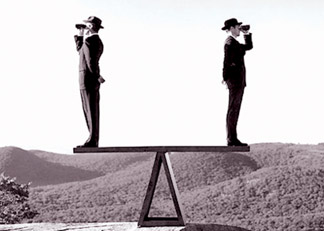|
Objectivity and fairness in journalism:
Reporters must report, not comment
Gaston De ROSAYRO
Over the past few decades, it seems to me, the media everywhere has
come under increasingly heavy criticism. You hear the refrain all the
time – that journalists should be objective and fair. Some news
organisations even use these terms in their slogans, claiming that they
are more ‘fair and balanced’ than their competitors. But what is
objectivity, and what does it mean to be fair and balanced?
Objectivity means basically that when covering hard news, reporters
don’t let their emotions or personal agendas get the better part of
their discretion. Which means they must have the will to rein in their
sentiments and representations. They must restrain themselves from
conveying their own feelings, biases or prejudices in their stories.
They are expected to accomplish this by using a language that is neutral
and avoiding characterizing people or institutions in ways good or bad.
|

Journalists should be fair and balanced |
But for the rookie reporter who is accustomed to writing personal
essays or journal entries, it can be hard to keep one’s own feelings out
of one’s stories. One trap newly recruited reporters fall into is the
frequent use of adjectives. Adjectives can easily convey one’s feelings
about a subject, subconsciously or otherwise.
For example take into account a typical opening statement one is
often assailed with such as this one: “The intrepid protesters
demonstrated against the unjust government policies.” Merely by using
the words “intrepid” and “unjust” the writer has quickly conveyed his
feelings on the story. It implies that the protesters are brave and just
in their cause and the government policies are wrong. For this reason,
hard-news reporters usually avoid using adjectives in their stories
On the other hand one must take into account that much of the
criticism levelled at journalists on the subject comes from disgruntled
elements who wish to air their own agenda. It has become fashionable for
those on the left, right, and even some self-acclaimed middle-of-the-roaders,
to lash out at the allegedly liberal bias of journalists today.
Today, more and more people, including many journalists, argue that
objectivity is impossible. Reporters, the reasoning goes, are
warm-blooded beings with feelings, opinions and biases that cannot help
but be reflected in their scribbling. The view that objectivity is
impossible begs the question: Why? It is not your point of view as a
reporter that determines objectivity. Rather it is your integrity, your
heart, your conscience, your professionalism and your devotion to duty.
Anyone who has written for the news media has little trouble
discerning what is objective and what is not. Only a reporter with no
conscience, no ethics, no sensibilities towards others could fail to be
objective without knowing it.
|

It is absolutely vital to get both sides of the story |
A reporter’s job is simply to report; not to express opinions or take
sides. When a reporter departs from ‘just the facts,’ believe me, he or
she knows it. When statements other than facts must be reported, good
reporters are sure that proper attribution - which we dealt with in a
previous article - is used.
Whatever a reporter’s own personal views may be on a subject, he or
she can write objectively on any subject by simply not injecting any of
their biases into it. Any time reporters begin to think subjectively,
they cannot help but be aware of it - and, if they are honest, they will
reverse their field.
Unfortunately, some newspaper readers have difficulty distinguishing
among various sources, often blaming a reporter or taking the newspaper
to task for something said by a source. Let us say for instance when
something negative is said about a politician, the paper often gets
angry telephone calls - even though the author of the remarks has given
attribution.
Agreed, a newspaper is liable for anything it prints, but proper
attribution shows there is no malice on the newspaper’s part. In
editorials, analytical pieces, and sometimes feature stories, reporters
and editors have more leeway to be somewhat less objective. But these
pieces are either located on the editorial or special feature pages.
They are often labelled ‘analysis’ or ‘viewpoint’ so that the reader, in
some other way is given notice that they may be less objective. But
newspapers can provide more in-depth stories, greater background
information and a greater understanding of the overall issues of any
subject while still retaining objectivity.
It is this very objectivity that gives a newspaper the believability
it needs to continue to publish with the respect of its readership. To
be scrupulously fair when covering issues of controversy it is
absolutely vital to get both sides, to interview people of opposing
viewpoints. But aside from issues of fairness, it is also part of doing
thorough reporting.
Objectivity and fairness apply not only to how a reporter writes
about an issue, but also to how he or she conduct themselves in public.
That means a reporter must not only be objective and fair but also
convey an image of being objective and fair.
There are a few caveats to remember when considering objectivity and
fairness as well. First, such rules apply to reporters covering
so-called hard news, or straight news stories, for the main news section
of a newspaper. Obviously they don’t apply to the political columnist
writing for the op-ed page, or to the film or book critic all of whom
make a living giving their opinions on a daily basis.
Second, remember that ultimately, reporters are in search of the
truth. And while objectivity and fairness are important, a reporter
should not let them get in the way of finding the truth. In other words,
use objectivity and fairness as tools to find the truth. That is your
goal as a reporter.
There are good business reasons to be ‘objective’ too, not least that
a newspaper does not want to make large parts of its community angry and
polarised. And, no doubt, libel law has played a significant role, too.
If a publication could say it ‘got both sides’ perhaps a libel plaintiff
would have more trouble winning.
Again, the idea of objectivity is a worthy one. But we are human. We
have biases and backgrounds and a variety of conflicts that we bring to
our jobs every day.
I would like to toss out objectivity as a goal, however, and replace
it with four other notions that may add up to the same thing. They are
pillars of good journalism: Thoroughness, Accuracy, Fairness and
Transparency.
The lines separating them are not always clear. They are open to wide
interpretation, and are therefore loaded with nuance in themselves. But
I think they are a useful way to approach quality journalism.
And in a nutshell to reporters, here is the moral of the story? Keep
your opinions to yourself! |



